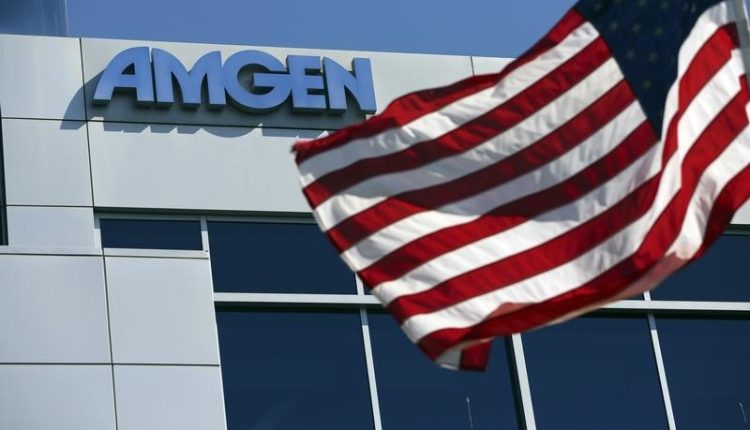© Reuters. FILE PHOTO: An Amgen sign is seen at the company’s office in South San Francisco, California October 21, 2013. REUTERS/Robert Galbraith/File Photo
By Deena Beasley
(Reuters) – The U.S. Federal Trade Commission’s decision on Friday to allow Amgen (NASDAQ:)’s takeover of Horizon Therapeutics (NASDAQ:) was the latest setback to its stated goal of stricter antitrust enforcement, and instead paved the way for Amgen to gain drugs not subject to new price negotiations and possibly lower the company’s tax burden.
The move signals the FTC’s uncertainty that a court would support its novel theory of future competition being disadvantaged by Amgen’s “bundling” of drugs in negotiations with insurers.
“I think there is some skittishness on whether to pursue this and develop new case law,” said Abiel Garcia, a partner at Kesselman, Brantly & Stockinger and a former deputy attorney general in California’s antitrust department.
Until Friday’s settlement, the case was scheduled to go before U.S. District Judge John Kness, who was nominated to the court by former President Donald Trump.
Federal antitrust authorities “may be reassessing their position given the recent slate of judicial decisions,” Garcia said. “They really didn’t get the traction they expected.”
The FTC in July abandoned its bid to block Microsoft (NASDAQ:)’s $69 billion deal to buy Activision Blizzard (NASDAQ:), after earlier losing a fight to stop Meta Platforms (NASDAQ:) from buying virtual reality content maker Within Unlimited.
Amgen’s acquisition of Horizon was the first biotech deal challenged since the FTC’s 2021 launch of a pharmaceutical merger task force, which has been followed by workshops designed to explore concerns over increased industry consolidation.
The settlement “is likely a win for Amgen,” which will avoid any potential break-up fee payment, said Evan Seigerman, a senior research analyst at BMO Capital Markets.
With Horizon, Amgen acquires drugs that won’t be affected by new U.S. negotiation requirements for blockbuster medications as well as possible tax advantages stemming from Horizon’s headquarters in Ireland.
The FTC, led by Lina Khan, a progressive, on Friday dropped its opposition to the $27.8 billion deal, stipulating settlement terms that largely reflected Amgen’s offer in June not to use Horizon’s rare disease drugs, which are administered by healthcare professionals, as leverage to secure better sales terms for products that are dispensed at pharmacies.
TAX SITUATION
The deal, now expected to close early in the fourth quarter, will help Amgen to diversify, adding two commercial products – thyroid eye disease treatment Tepezza and gout drug Krystexxa – along with experimental drugs.
“They are essentially buying an orphan drug portfolio,” Yaron Werber, an analyst at TD Cowen, told Reuters. Horizon’s drugs, and those Amgen acquired in last year’s ChemoCentryx (NASDAQ:) deal, are not subject to the Inflation Reduction Act (IRA) enacted by the Biden administration in 2022, he explained.
Orphan status, which includes an exclusive marketing period and potentially faster approvals, is granted by the U.S. Food and Drug Administration to encourage development of drugs for rare conditions.
The IRA requires the U.S. Medicare health program that covers 66 million people to, for the first time ever, negotiate prices for drugs it spends the most on. Medications for rare diseases, however, are exempt.
The recently released list of the initial 10 prescription medicines subject to the price negotiations includes Amgen’s arthritis drug Enbrel, which had 2022 sales of $4.1 billion.
Jefferies analyst Michael Yee, in a recent research note, said the IRA could encourage more pharmaceutical deals as larger firms look to avoid exposure to Medicare and instead seek out smaller companies with rare disease portfolios.
The pharmaceutical industry has warned that the new law will have unintended consequences, including incentives for drugmakers to develop complex biologic treatments rather than chemically synthesized drugs that are easier to manufacture.
Analysts said the Horizon deal could also help Amgen’s tax situation.
The U.S. Internal Revenue Service has accused Amgen of underpaying billions in back taxes from 2010 to 2015, mainly by attributing what should have been U.S. taxable income to a Puerto Rico manufacturing unit.
The United States has largely eliminated once-lucrative corporate tax benefits for pharmaceutical manufacturing operations in Puerto Rico, a U.S. territory.
But if a drug is made in Ireland, one of the world’s largest exporters of medicines, U.S. parent companies can reduce taxes by shifting profits to an Irish manufacturing subsidiary.
Horizon offers Amgen “potentially a better tax jurisdiction related to Irish manufacturing plants … Amgen has a new manufacturing process they could potentially move there,” Cowen’s Werber said.
Read the full article here

